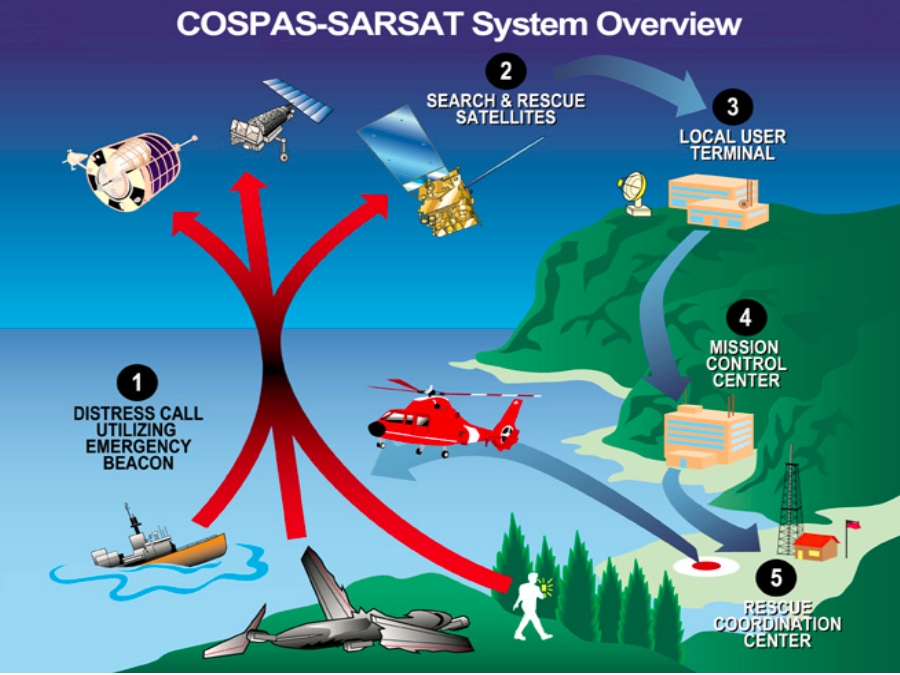Thales Alenia Space is offering a breakthrough technology for Search & Rescue satellite solutions, called MEOLUT NEXT. It is to be deployed within the scope of the global COSPAS/SARSAT system.
What's COSPAS/SARSAT?

COSPAS/SARSAT is an intergovernmental organization founded by Canada, the United States, Russia and France. In operation since 1985, it provides a free global Search and Rescue service, using the infrastructures from 43 countries worldwide. French space agency CNES is the official French representative for this organization. Today, some 500,000 ships and 150,000 aircraft are equipped with COSPAS/SARSAT distress beacons, allowing them to use this service. The service has saved more than 37,000 lives since the outset.
How does COSPAS/SARSAT work?

The beacon on a plane or ship is triggered, manually or automatically, and transmits a distress signal at a frequency of 406 MHz. This signal is picked up by surveillance satellites, which retransmit it to a Local User Terminal (LUT). This terminal processes the signal, calculates the position of the transmitting beacon, and sends this information to the Mission Control Center (MCC). The MCC is in charge of filtering out false alerts, and contacting the most appropriate Rescue Coordination Center (RCC), to save the persons in danger.
Until now, this system has called on secondary payloads on observation satellites in both low Earth orbit (LEOSAR) and geostationary Earth orbit (GEOSAR), which will be reaching end-of-life towards 2020. Satellites in medium Earth orbit, MEOSAR, with secondary payloads mounted on GPS, Galileo and Glonass positioning system satellites, will then take over this task, improving performance, precision and responsiveness.
The MEOSAR approach
Because of the large number of satellites visible to a given beacon (up to 30), the MEOSAR service can indicate the position of an endangered person in less than 10 minutes (versus 2 hours for the LEO and GEO generations). Furthermore, the position-determination accuracy improves to just 200 meters, versus 5 kilometers previously. Another major advantage is that moving beacons (typically in aircraft) can be detected, which was not the case previously. MEOSAR services will start operating by the end of 2018, and will be able to detect the locations of aircraft in trouble during their flight.
Thales Alenia Space's MEOLUT NEXT solution

Thales Alenia Space already contributes to the COSPAS/SARSAT system as exclusive supplier of digital signal processors (DSP) on LEOSAR satellites since the 1990s. Today, Thales Alenia Space is offering a brand-new solution concerning the Local User Terminals (LUT). These terminals are in charge of processing the signals received from the satellites and calculating the position of the beacon, then sending it to the Mission Control Center.
The principle of Thales Alenia Space's solution is to use two small active antennas, each comprising 64 patches. These antennas are fitted with a high-performance RF (radio frequency) unit, for upstream digitizing of the signal, followed by a highly innovative algorithmic processing method.
Conventional MEOLUT systems, each fitted with six large parabolic antennas in an area about the size of a football field (or pitch…), are capable of tracking signals from six satellites (1 per antenna). Thales Alenia Space's MEOLUT NEXT solution, with its two small antennas located in less than 10 square meters, tracks up to 30 satellites, thus significantly enhancing the distress beacon detection rate, while also expanding the coverage zone. Furthermore, since there are no mechanical components in these antennas, maintenance costs are the lowest on the market.
Initiated with support from French space agency CNES, this project was first validated from the technical standpoint, and now allows Thales Alenia Space to offer a production version. The MEOLUT NEXT solution from Thales Alenia Space boosts both precision and performance, and is easier to deploy and maintain, meaning that it will undoubtedly improve the COSPAS/SARSAT global system's performance.


